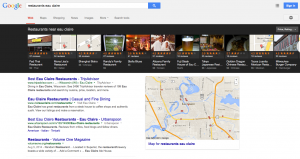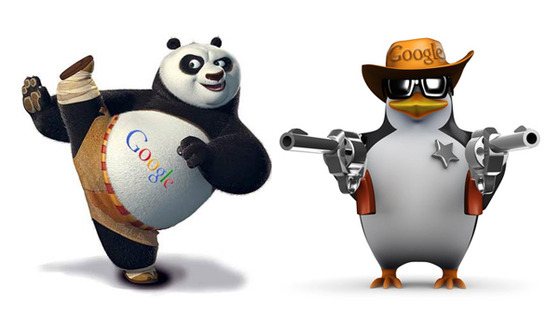Over the last several years, Google has updated their algorithm that determines how your website ranks on their search results pages. What we’ve learned through all of these updates is that Google is trying to provide the most relevant results to what you’re searching for. The definition of relevance, however, has evolved over time.
Relevance in Search Engines
Relevance used to mean that you had the most backlinks and popularity among other sites. Then people started using money to gain popularity, trying to beat the system. Google’s response: Google Panda Update.
Relevance used to mean that your site had a dense amount of specific keywords in it. Then people started hiding text and stuffing keywords wherever they could to trick Google into ranking them first. Google’s response: Google Penguin Update.
Well, today, Google has pretty much manhandled every trick in the book and the only way to have long-term success in search engine marketing is to focus on your users, your content, and the overall health and usability of your website. While you still want to optimize your content using keywords, structure, tags, etc., you can’t take advantage of the rules and “trick” Google into putting you at the top of the list. Google, like your users, will respond positively to a great user experience, so that should be the goal when building or redesigning your website.
What did all of those Google updates do?
I’m not going to mention all of the many versions of updates that Google has performed, but here’s a basic recap of major recent algorithm updates from Google:
Google Panda – February 2011
Google started filtering out sites with ‘thin’ content that didn’t have much substance. This is really when it became more important to focus on the quality of your content, not just quantity.
Google also heard from users that they didn’t like the experience of having to scroll past a bunch of ads before getting to the actual content, so they rewarded sites that had their original content at the top of the page.
Google Penguin – April 2012
Google penalized those sites who were spamming the search engine using keyword stuffing, cloaking, paid links, or other ‘black-hat’ SEO tactics. This update also got rid of a lot of the ‘aggregator’ websites whose sole purpose was to provide backlinks for boosting SEO. If you want to get backlinks to your site, you need to earn them by producing and sharing useful content.
Google Pigeon – July 2014
(Actually, Google didn’t name this one. Pigeon was the label given by Search Engine Land.)
In this update, big directory sites like Yelp and Trip Advisor have benefited the most. This may be because of Google wanting to offer better comparison shopping for users, or a better way to offer reviews to users. However, it also reaffirms Google’s push for local search. Many changes lately have been focused on localizing the search results to help users find services that are closest to them at that moment, a trend that is largely being driven by the increasing use of mobile devices. According to Google, the goal is “to provide a more useful, relevant and accurate local search results.”
Other recent Google updates include the loss of author photos, video snippets, and review stars to reduce visual “distractions” in the search results page. That’s not to say that all visuals are going away – you’ll still see video screenshots come up with a YouTube listing – but you won’t see these extra visuals as much.
What can you do to make sure your rankings get to (and stay) at the top?

This search results page from Google shows the local carousel full of images and reviews/ratings, and the directory listings at the top of the organic results.
If you are a restaurant, hotel, service business, retail shop – make sure your listings on directories like Yelp, TripAdvisor, UrbanSpoon, and others are up to date and consistent (name, address, phone number, web address) across all sites, including Google Plus.
Make sure your site has a solid SEO structure and good general web practices, such as renewing your domain for several years, establishing/earning backlinks from partners, vendors, related industries, etc.
Restaurants, hotels, and retail stores in the ‘carousel’ have heavy emphasis on image and ratings – pay attention to these! Make sure you have nice photos uploaded to your Google Plus page, and ask your best customers to leave you reviews when you bring them their check (or send a thank you or make a follow up call).
Contact us at JB Systems today to learn more about our ongoing website SEO service.

